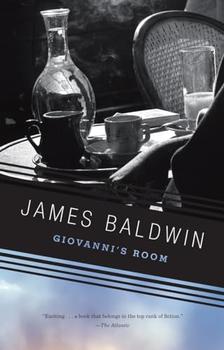Summary | Excerpt | Reading Guide | Reviews | Beyond the Book | Read-Alikes | Genres & Themes | Author Bio

This article relates to Giovanni's Room
 While rereading and reviewing Giovanni's Room by James Baldwin, a book that has stayed with me for many years, I wanted to see what others have taken away from the novel, an early work of queer literature and a mid-century story of an American confronting his Americanness overseas. It was interesting to see recurrent themes and references in what writers today have to say about Baldwin's novel, and to find similarities in observation and experience between my own perspective and theirs. Essays by Colm Tóibín and Garth Greenwell below each use Henry James' The Ambassadors, another story of American life abroad, as a point of comparison. Both Greenwell and Gabrielle Bellot contrast their powerful feelings upon first reading Giovanni's Room with its somber implications.
While rereading and reviewing Giovanni's Room by James Baldwin, a book that has stayed with me for many years, I wanted to see what others have taken away from the novel, an early work of queer literature and a mid-century story of an American confronting his Americanness overseas. It was interesting to see recurrent themes and references in what writers today have to say about Baldwin's novel, and to find similarities in observation and experience between my own perspective and theirs. Essays by Colm Tóibín and Garth Greenwell below each use Henry James' The Ambassadors, another story of American life abroad, as a point of comparison. Both Greenwell and Gabrielle Bellot contrast their powerful feelings upon first reading Giovanni's Room with its somber implications.
"James Baldwin's Giovanni's Room: an antidote to shame" by Garth Greenwell
In an essay for the Guardian, author Garth Greenwell recalls discovering Giovanni's Room as a queer teenager while haunting the lesbian and gay section of a bookstore in Louisville, Kentucky. He describes what the books he found there, including Baldwin's novel, meant to him: "It's hard to overstate...the solace I took from them and from their vision of queer life as possessed of a measure of human dignity. It didn't matter that that dignity was so often the dignity of tragedy; it was still a kind of antidote to shame." He goes on to discuss shame as a key feature of Giovanni's Room, as well as how the book structures time, "microclimates of feeling," and Baldwin's examination of American mythology.
"James Baldwin in Paris: On the Virtuosic Shame of Giovanni's Room" by Gabrielle Bellot
In this piece for LitHub, staff writer Gabrielle Bellot reflects on Baldwin's time in Paris and how coming to terms with his queerness formed the circumstances under which he wrote Giovanni's Room. She discusses how the novel interacts with race, gender, and sexuality, highlighting a passage that Greenwell also evokes, in which main character David shows utter disgust towards a person who may be transgender, revealing his deep-seated fear of anything that threatens his confidence in his masculinity. Bellot describes first experiencing Giovanni's Room and being impressed by its beauty, but now feeling overwhelmed by its characterization of self-loathing: "The moments where Baldwin's language seems as virtuoso-like as Paganini on a violin were mind-blowing. On rereading the novel now, though, I feel something quite different. It is so heavy with shame that it hurts."
"The Unsparing Confessions of Giovanni's Room" by Colm Tóibín
This New Yorker essay first served as the introduction for an edition of Giovanni's Room published in 2016 by Everyman's Library. Novelist Tóibín plunges into the mechanics of Baldwin's prose style and structure, comparing the novel to works such as James' The Ambassadors, Ernest Hemingway's The Sun Also Rises, Nella Larsen's Passing, and Oscar Wilde's "De Profundis." While Tóibín leaps from one subject to another and doesn't fully explore every idea introduced in this intro, he gives a sense of how Giovanni's Room relates to other narratives that take on a confessional tone, and to other American literature. The piece begins and ends with the theme of American identity, exploring how Baldwin reflected the flaws of his home country in his protagonist's experiences abroad.
James Baldwin in 1955, photo by Carl Van Vechten, courtesy of the Library of Congress
Filed under Books and Authors
![]() This article relates to Giovanni's Room.
It first ran in the January 29, 2025
issue of BookBrowse Recommends.
This article relates to Giovanni's Room.
It first ran in the January 29, 2025
issue of BookBrowse Recommends.
No pleasure is worth giving up for the sake of two more years in a geriatric home.
Click Here to find out who said this, as well as discovering other famous literary quotes!
Your guide toexceptional books
BookBrowse seeks out and recommends the best in contemporary fiction and nonfiction—books that not only engage and entertain but also deepen our understanding of ourselves and the world around us.